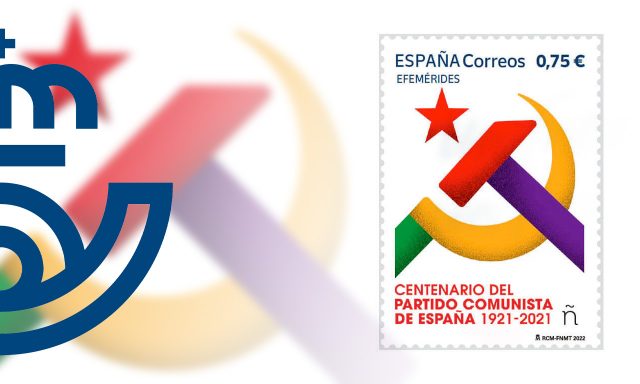
The Spanish public company Correos announced last November 10 that they were scheduling the issue of a stamp commemorating the centenary of the Communist Party of Spain for November 14. The stamp design displayed by Correos showed the famous communist symbols of the hammer and sickle along with the five-pointed star. All these elements would prominently display the three colors of the spanish republican flag: red, yellow and purple; linking the stamp to the period preceding the Spanish Civil War. Today, the conflict is a resource used in politics to awaken old ghosts that reinforce the hypothesis that Spanish society is still divided.
In Spain it is common to use the term “the two Spains”, which refers to the two political poles where all Spaniards are concentrated, classifying the nationals in two blocks that seem irreconcilable. In this context, some politicians or public personalities have expressed the desire to reconcile and bridge the differences between these two groups with the aim of moving together towards a common project for the country. For example, Santiago Abascal, leader of Vox, exposed in the electoral debate of the last general elections how Spaniards whose grandparents had been mobilized by one side or the other in the civil war should not be forced to choose one side or the other. In this context, he reached out to Pablo Casado, leader of the Popular Party, to be able to “vindicate his republican grandfather so that he can feel proud of him”.
It is significant that immediately after this call for unity, Mr. Pablo Iglesias, former Vicepresident of Spain and leader of the extreme left-wing party “Unidas Podemos”, showed his astonishment at Abascal’s statements, comparing those mobilized on the national side with the German SS during the Second World War. The left in Spain has always shown a special interest in remembering the events of the civil war. After the defeat of the Republican side, a dictatorship administered by General Francisco Franco was established in Spain, which led to the exile of many Spanish communists, giving a fictitious legitimacy to the communists of the present time to proclaim themselves the defenders of democracy.
The communists did not defend democracy: they tried to put an end to it.
The company accompanied the proposed stamp issue with a description stating that “the Communist Party was the driving force behind the forces that fought for democracy”, thus contributing to the communist romanticization. However, neither Pablo Iglesias nor Correos seem to remember the thesis of Marx and Engels in which they call for confrontation against the bourgeois state and, therefore, against bourgeois democracy. The Communist Party was founded in 1921, like the great majority of the communist parties of Europe, immediately after the triumph of the Bolchevik Revolution, to perpetrate the revolution in their respective countries as parties in the orbit of Moscow. The purpose of the party from its birth was none other than to demolish democracy and establish communism, doctrines totally antagonistic.
The participation of the Communist Party in the coup attempts in 1934 against the newly elected right-wing coalition at that time or the massacre of 2,500 people in Paracuellos, Madrid, are just two examples of the real nature of the Communist Party of Spain. Opposite to those politicians who look towards the future of Spain and reconciliation among Spaniards, Correos has decided to perpetuate the perversion of democracy by communism, making from public institutions to encourage the commemoration of episodes that far from building a country among all, intend to polarize and divide Spaniards in the style of the left wing currently in power.
Finally, a group of Christian lawyers managed to suspend the issuance of the stamp, while members of the left-wing parties in Spain have shown their discontent in social networks. Alberto Garzón, Spain’s current minister of Consumer Affairs, called the lawyers “ultras”. Nevertheless, the perversion of public institutions that Spain is experiencing under a left-wing government is on record, leaving Spaniards faced with the decision of either the reconciliation they can find in the current opposition, or the polarization represented by this government.



 Subscribe
Subscribe